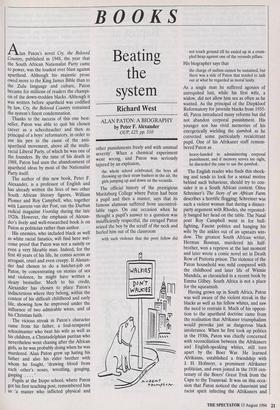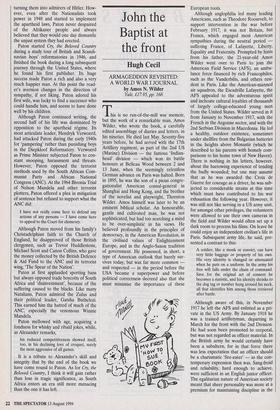BOOKS
Beating the system
Richard West
ALAN PATON: A BIOGRAPHY by Peter F. Alexander OUP, £25, pp. 510 Alan Paton's novel Cry, the Beloved Country, published in 1948, the year that the South African Nationalist Party came to power, was the loudest ever blast against apartheid. Although his majestic prose owed more to the King James Bible than to the Zulu language and culture, Paton became for millions of readers the champi- on of the down-trodden blacks. Although it was written before apartheid was codified by law, Cry, the Beloved Country remained the system's finest condemnation.
Thanks to the success of this one best- seller, Paton was able to quit his chosen career as a schoolteacher and then as principal of a boys' reformatory, in order to use his pen in the cause of the anti- apartheid movement, above all the multi- racial Liberal Party, of which he was one of the founders. By the time of his death in 1988, Paton had seen the abandonment of apartheid ideas by most of the Nationalist Party itself.
The author of this new book, Peter F. Alexander, is a professor of English and has already written the lives of two other South African literary figures, William Plomer and Roy Campbell, who, together with Laurens van der Post, ran the Durban radical magazine Voorslag during the late 1920s. However, the emphasis of Alexan- der's lively and well-researched book is on Paton as politician rather than author.
His enemies, who included black as well as white racial fanatics, will find here wel- come proof that Paton was not a saintly or even a very likeable man. Indeed, for the first 40 years of his life, he comes across as arrogant, cruel and even creepy. If Alexan- der had chosen to do a hatchet-job on Paton, by concentrating on stories of sex and violence, he might have written a sleazy bestseller. Much to his credit, Alexander has chosen to place Paton's indiscretions where they belong, within the context of his difficult childhood and early life, showing how he improved under the influence of two admirable wives, and of his Christian faith.
The vicious streak in Paton's character came from his father, a foul-tempered schoolmaster who beat his wife as well as his children, a Christadelphian puritan who nevertheless went chasing after the African girls, as he was probably doing when he was murdered. Alan Paton grew up hating his father and also his elder brother with whom he fought, 'drawing blood from each other's noses, wrestling, gouging, gasping . . • . ' Pupils at the Ixopo school, where Paton got his first teaching post, remembered him as 'a master who inflicted physical and other punishments freely and with unusual severity'. When a chemical experiment went wrong, and Paton was seriously injured by an explosion,
the whole school celebrated, the boys all throwing up their straw bashers in the air, the girls jumping up and down on the veranda.
The official history of the prestigious Maritzburg College where Paton had been a pupil and then a master, says that its famous alumnus suffered from uncontrol- lable rages. On one occasion when he thought a pupil's answer to a question was insufficiently respectful, the enraged Paton seized the boy by the scruff of the neck and hurled him out of the classroom
with such violence that the poor fellow did not touch ground till he ended up in a crum- pled heap against one of the veranda pillars.
His biographer says that
the charge of sadism cannot be sustained, but there was a side of Paton that tended to lash out at what he regarded as moral laxity.
As a single man he suffered agonies of unrequited lust, while his first wife, a widow, did not allow him sex as often as he wanted. As the principal of the Diepldoof Reformatory for juvenile blacks from 1935- 48, Paton introduced many reforms but did not abandon corporal punishment. His younger son has vivid memories of his energetically wielding the sjambok as he corrected some particularly recalcitrant pupil. One of his Afrikaner staff remem- bered Paton as
heavy-handed in administering corporal punishment, and if memory serves me right,
he discarded the cane to use the sjambok.
The English reader who finds this shock- ing and tends to look for a sexual motive behind such behaviour, should try to con- sider it in a South African context. Olive Schreiner's The Story of an African Farm describes a horrific flogging; Schreiner was such a violent woman that during a dinner- party argument with Rhodes, she repeated- ly banged her head on the table. The Natal poet Roy Campbell went in for bull- fighting, Fascist politics and hanging his wife by the ankles out of an upstairs win- dow. The greatest South African writer, Herman Bosman, murdered his half- brother, won a reprieve at the last moment and later wrote a comic novel set in Death Row of Pretoria prison. The violence of the Paton household was mild compared with the childhood and later life of Winnie Mandela, as chronicled in a recent book by Emma Gilbey. South Africa is not a place for the squeamish.
Having grown up in South Africa, Paton was well aware of the violent streak in the blacks as well as his fellow whites, and saw the need to restrain it. Much of his opposi- tion to the apartheid doctrine came from the realisation that Afrikaner triumphalism would provoke just as dangerous black intolerance. When he first took up politics in the 1930s, Paton was chiefly concerned with reconciliation between the Afrikaners and English-speaking whites, still torn apart by the Boer War. He learned Afrikaans, established a friendship with J. H. Hofmeyr, a prominent Afrikaner politician, and even joined in the 1938 cen- tenary of the Boers' Great Trek from the Cape to the Transvaal. It was on this occa- sion that Paton noticed the chauvinist and racist spirit infecting the Afrikaners and turning them into admirers of Hitler. How- ever, even after the Nationalists took power in 1948 and started to implement the apartheid laws, Paton never despaired of the Afrikaner people and always believed that they would one day dismantle the unjust system they had erected.
Paton started Cry, the Beloved Country during a study tour of British and Scandi- navian boys' reformatories in 1946, and finished the book during a long subsequent journey through the United States, where he found his first publisher. Its huge success made Paton a rich and also a very much happier man. At this point the read- er's aversion changes in the direction of sympathy, if not liking. Paton adored his first wife, was lucky to find a successor who could handle him, and seems to have done well by his children.
Although Paton continued writing, the second half of his life was dominated by opposition to the apartheid regime. Its most articulate leader, Hendryk Verwoerd, had attacked Paton during the early 1940s for 'pampering' rather than punishing boys in the Diepkloof Reformatory. Verwoerd as Prime Minister subjected Paton to con- stant snooping, harassment and threats. However, Paton opposed the terrorist methods used by the South African Com- munist Party and African National Congress (ANC). At the 1964 Bivonia Trial of Nelson Mandela and other terrorist plotters, Paton offered a plea in mitigation of sentence but refused to support what the ANC did:
I have not really come here to defend any actions of any persons — I have come here to appeal to the Court for clemency.
Although Paton moved from his family's Christadelphian faith to the Church of England, he disapproved of those British clergymen, such as Trevor Huddlestone, Michael Scott and Canon Collins, who gave the money collected by the British Defence & Aid Fund to the ANC and its terrorist wing, 'The Spear of the Nation'.
Paton at first applauded sporting bans but always opposed trade boycotts of South Africa and 'disinvestment', because of the suffering caused to the blacks. Like many Natalians, Paton admired the Zulus and their political leader, Gatsha Buthelezi. This earned him the hatred of much of the ANC, especially the venomous Winnie Mandela.
Paton mellowed with age, acquiring a fondness for whisky and ribald jokes, while, as Alexander remarks,
his reduced competitiveness showed itself, too, in his declining love of croquet, surely the most aggressive of all games.
It is a tribute to Alexander's skill and integrity that by the end of the book we have come round to Paton. As for Cry, the Beloved Country, I think it will gain rather than lose in tragic significance, as South Africa enters an era still more menacing than the one it has left.











































 Previous page
Previous page